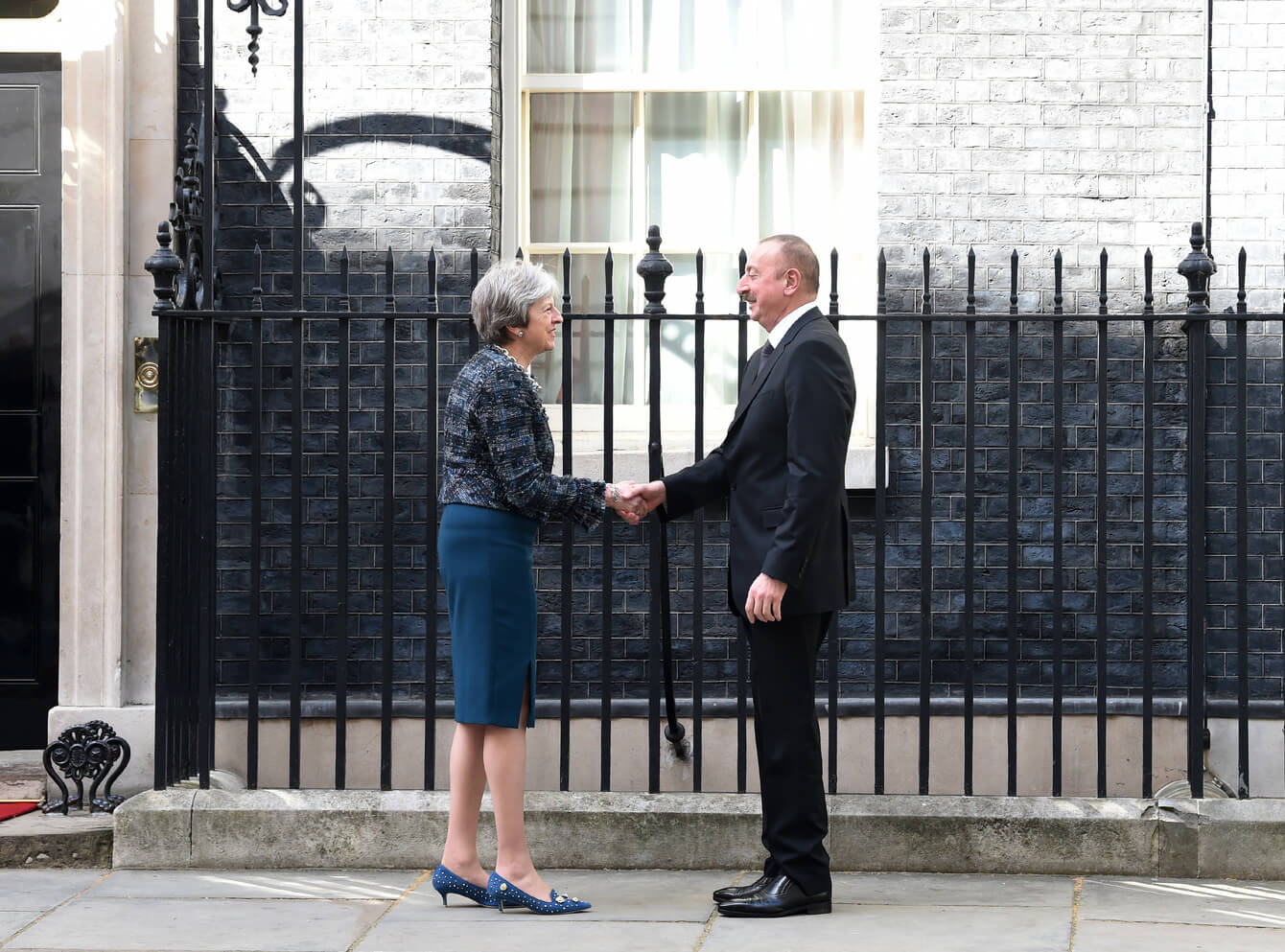
On the evening of Thursday 26th April 2018, it was warm and sunny in London. President Ilham Aliyev strode down Downing Street and was met by Prime Minister Theresa May with smile and a handshake.
They posed for the cameras on the red carpet outside No 10 and then retired inside.
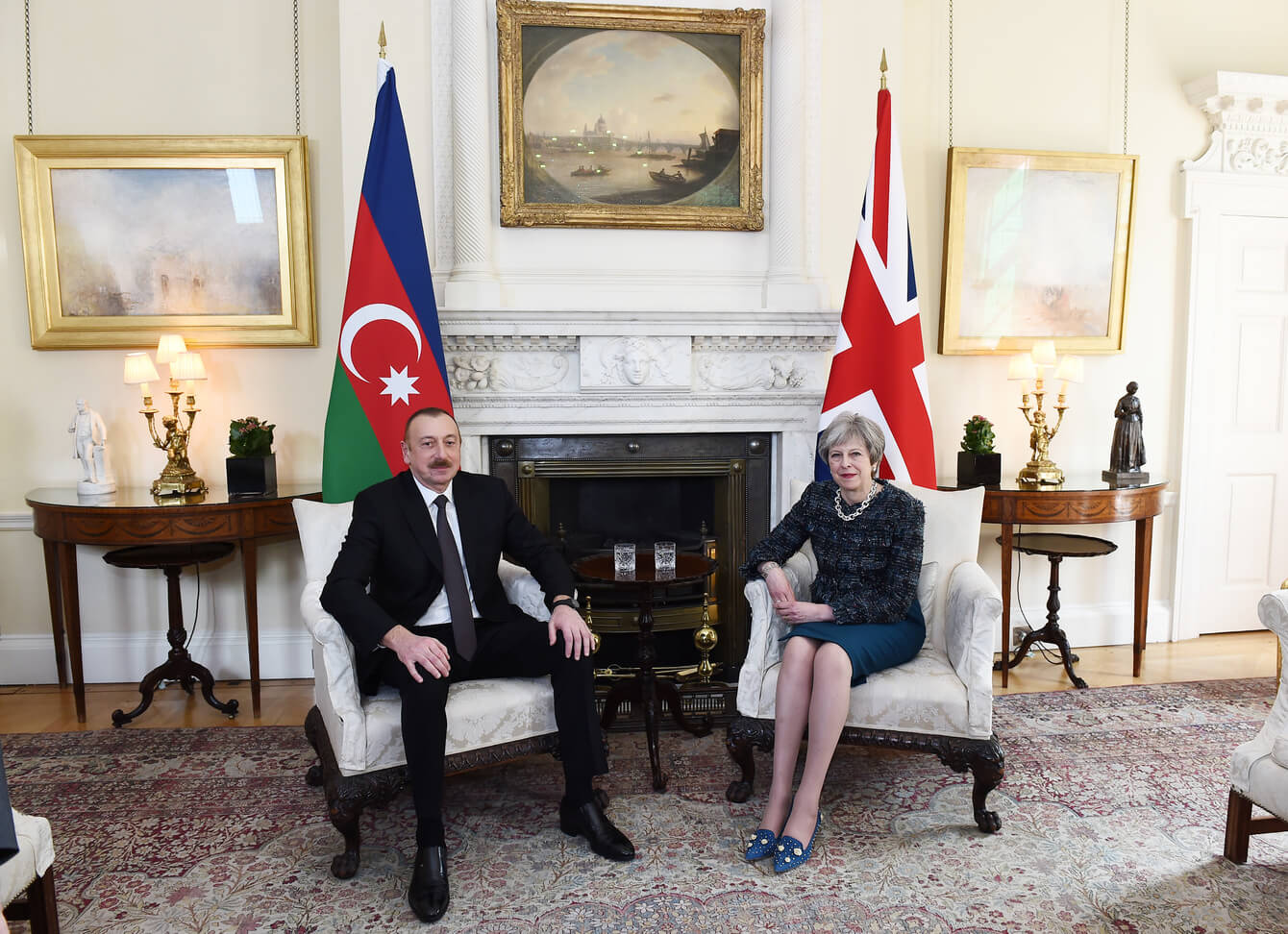
A short formal chat over a couple of glasses of water in the shadow of an Azeri national flag and a Union Jack, and then they stepped into an adjoining room to stand behind CEO of BP, Bob Dudley and Rovnag Adbullayev, President of SOCAR. The two businessmen signed a production sharing agreement committing the two companies to the joint exploration of Block D230 which covers 3,200 square kilometres of unexplored seabed in the Azeri Caspian. The agreement is set to run for another 25 years, until 2043.
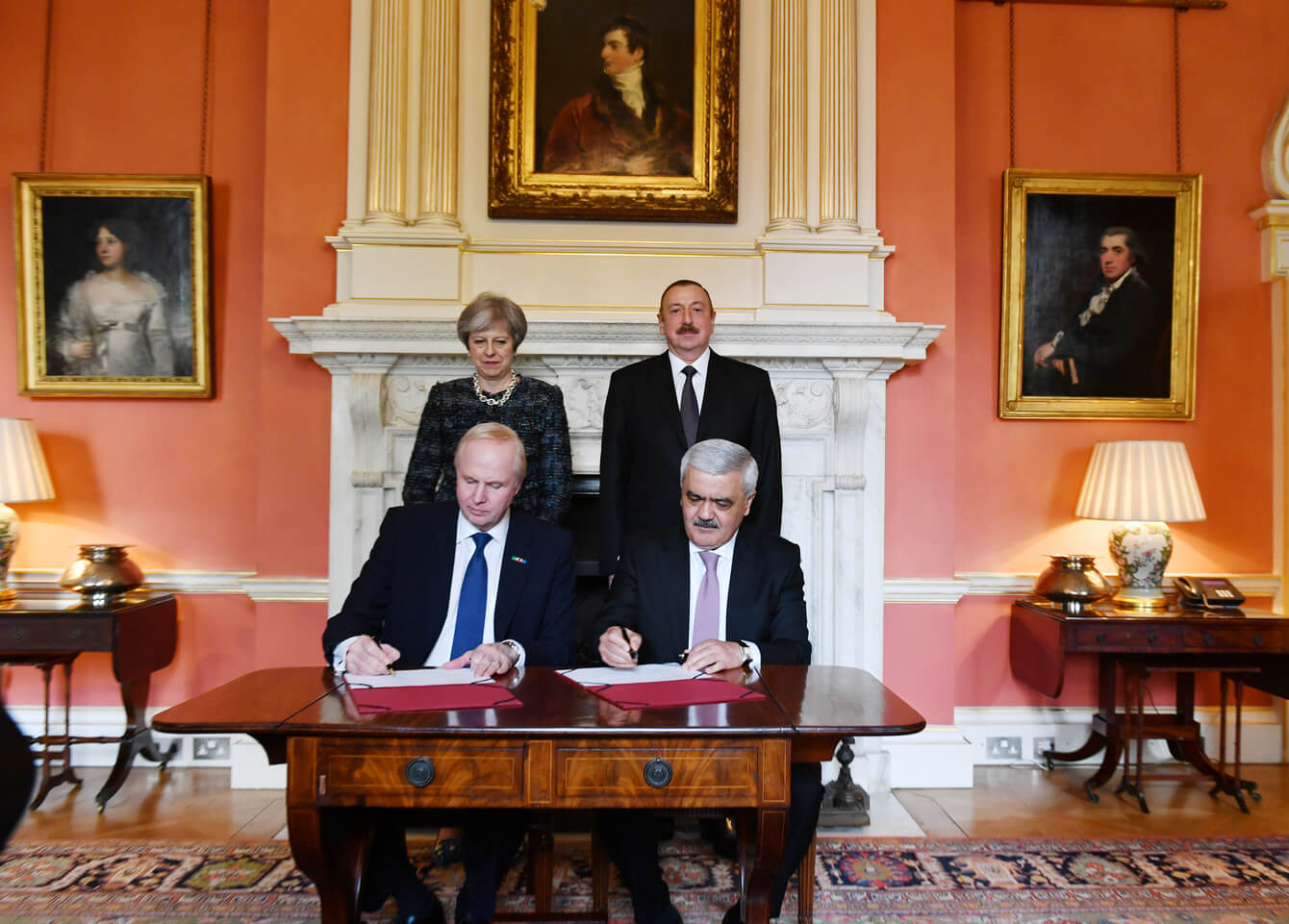
The official photographer recorded the event again and Aliyev stepped back outside and strode to his limousine.
The entire ritual cannot have taken more than 30 minutes.
In the same half hour dusk was falling after a warm day in the high mountains to the east of Ardahan in northern Turkey. In the village of Calabas snow was in deep mounds at the sides of the muddy roads, but spring had arrived and the cattle had long since been set to graze on the pale brown hillsides. Close to the village were two buried pipelines. The Baku Tbilisi Ceyhan (BTC) pipe that carries oil from the Caspian to the Mediterranean, and the TANAP pipe that carries gas from the offshore Azeri gas fields into the Turkish grid to the west.
There were no photographs to record that day’s events in this community of farmers, but life in the village was intimately intertwined with the ritual between the President, the Prime Minister and the two billionaires. Ever since 2001, when detailed planning for the BTC pipeline (much of it conducted in Hammersmith, London) determined that the route of this oil artery would pass through the grazing lands of Calabas, the village has found itself in a ‘energy corridor’ of strategic importance.
In the intervening 17 years since 2001, two massive steel tubes were laid in deep trenches either side of the village, one carries the gas, the other the oil. As the keeper of the village shop and cultural centre told us almost a decade ago: “We are truly living in an energy corridor – the alley between the energy flows. This is strategic area.”
Being in a strategic area, means that the village, like so many around it along the route of the pipelines, lives effectively under military rule. The villagers, and the citizens of the nearby town of Ardahan, are constantly under police surveillance and at the slightest whim the Turkish military police, the Jandarma, are called in. Turkish state security, as in Azerbaijan and Georgia, is intense all along the 3,573 kilometres of the combined BTC and TANAP oil and gas pipelines, but in North Eastern Turkey security is particularly oppressive for this is an area with a strong Kurdish population.
The Turkish state has effectively been at war with its Kurdish population since the state’s founding in 1923, but there have been periods of stark oppression. On 20th January 2018 the Turkish Army launched a new offensive against the Kurdish enclave in northern Syria and as fighting began, security operations against Kurdish populations inside Turkey intensified, and that includes along the route of the oil and gas pipelines.
Immediately our concern for friends in the area grew. However access is hard for foreign visitors, who – past experience tells us – are constantly trailed. It is in the interests of the Turkish state that the area remains invisible to foreign eyes. And it is in the interest of the companies that own and operate the two pipelines, foremost among them BP and SOCAR, that their machine remains invisible.
The UK Prime Minister helps create that cloak of invisibility.
The 30-minute meeting with Aliyev gained no UK coverage for Teresa May. (The Government Press Release was initially so cursory that it had a glaring misspelling in its headline ‘Theresa May met President Aliyez’). But the event was all over the Azeri national press – ‘President of the Republic of Azerbaijan has arrived in the UK for a visit at the invitation of Prime Minister of the United Kingdom of Great Britain and Northern Ireland’.
The Azeri President was inaugurated only eight days before the meeting at Downing Street. Except for a state visit to President Erdogan of Turkey, the UK prime minister was the first head of state to receive Aliyev after he won another 7 year term in an election that was widely seen as fraudulent, in which the opposition parties did not stand and in which the most prominent opposition politician, Ilgar Mamadov, did not participate as he is still in jail after five years on dubious charges. (see our previous blog)
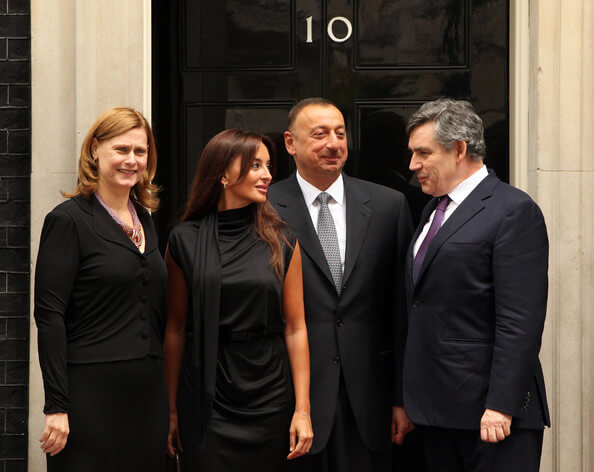
It is easy to see why Aliyev was delighted to be received by Teresa May, after all he made a similar visit to May’s predecessor David Cameron in August 2012, and Prime Minister Brown in July 2009.
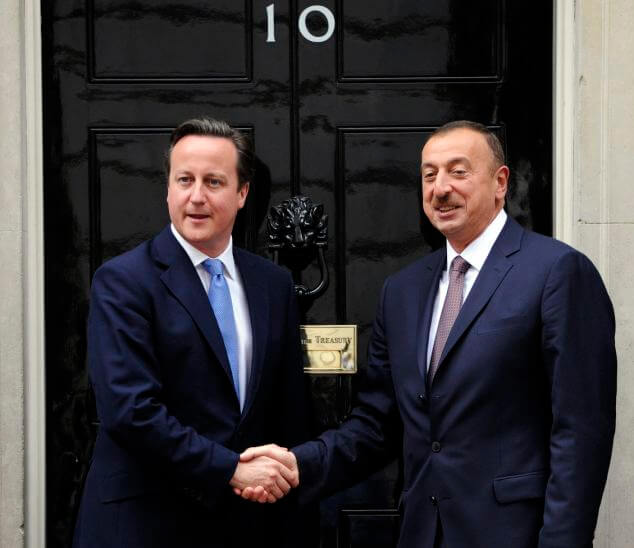
And it is not too hard to see why the UK government is eager to fete this autocrat, scion of a family now set to rule Azerbaijan for 54 years. The UK was the first western state to officially recognise independent Azerbaijan – after intense lobbying by BP (we detail this in The Oil Road – Journeys from the Caspian Sea to the City of London). And Aliyev serves a useful purpose for the UK at this juncture of Brexit.
It is not surprising that earlier in the day, in the space of 45 minutes, key actors shuttled into a hotel room to meet President Aliyev.
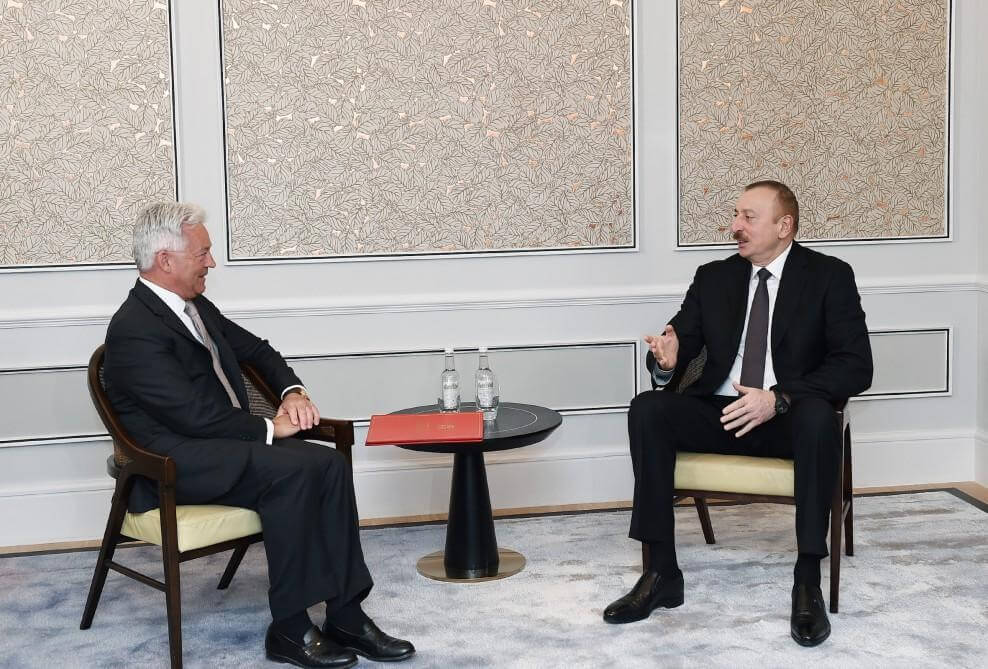
There was Baroness Rona Fairhead, Minister of State for Trade and Export Promotion with her civil servants, then Alan Duncan MP, Minister of State for Europe & the Americas,
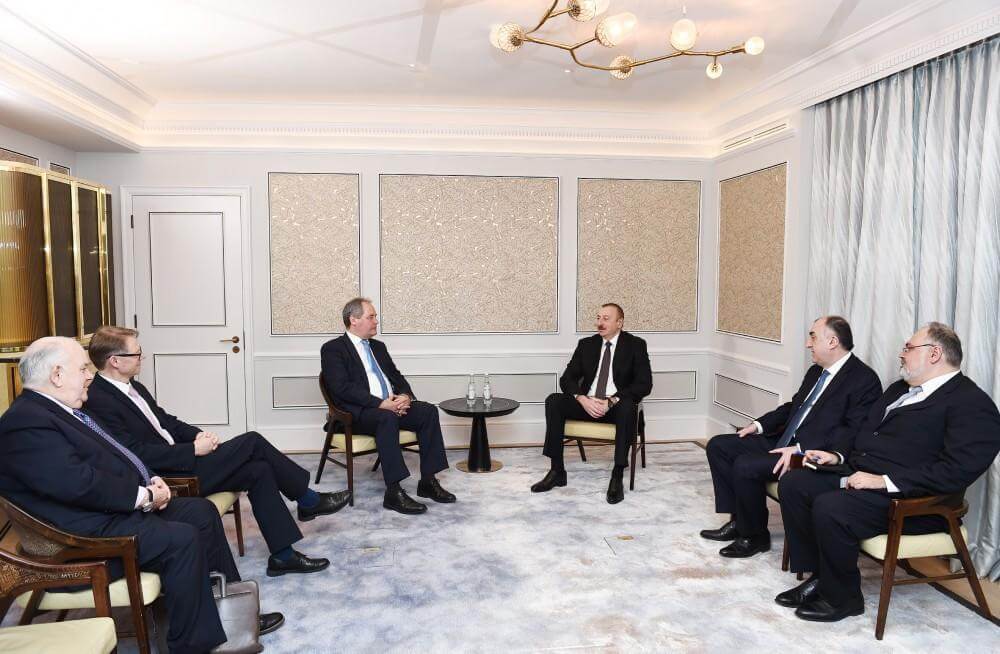
and a ‘group of British MPs’ – Lord Bob Blackman (Conservative); Lord David Evans (Labour) and David Morris MP (Conservative).
All of these dignitaries ‘congratulated President Aliyev on his victory’. Although two MP’s went a step further:
‘Lord David Evans and David Morris noted that they monitored the voting process, hailing the excellent organisation of the election’
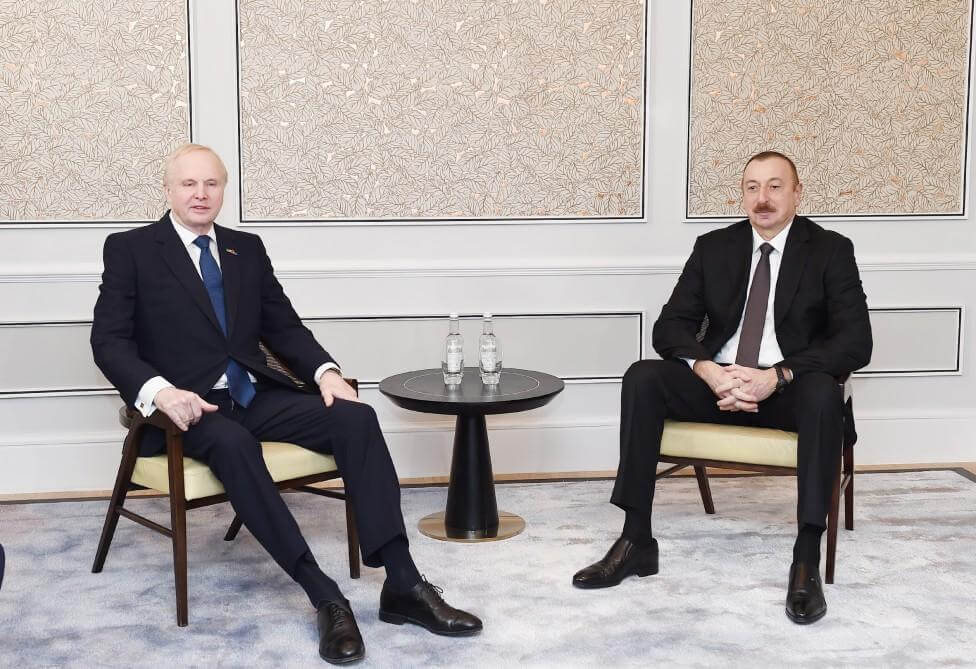
Clearly the most important meeting was with CEO of BP, Bob Dudley, head of the largest single foreign investor in Azerbaijan. Aliyev’s official website did not note whether Dudley ‘congratulated President Aliyev on his victory’, but it did announce:
‘They exchanged views on the work carried out under the Shah Deniz (gas) project, as well as the opening on the TANAP project this June.’
In a matter of a few weeks gas will be pumped via the TANAP pipeline from the offshore fields in Azerbaijan to the Turkish city of Eskisehir, west of Ankara. The next section of TANAP, running from Eskisehir to the Turkey-Greek border is under construction. As the Trans-Adriatic Pipeline (TAP) proceeds across Greece and Albania towards Italy, the companies behind the entire venture (known as the Euro-Caspian Mega Pipeline) boldly assert that this machine will pump gas to Western Europe by early 2020.
And the machine moves forward with a seeming relentlessness. As it does so it is largely invisible to the public in Western Europe who will consume the gas that it pumps, as it deliver profit to BP and its sister corporations.
It is invisible in part because the UK public does not see the meetings that Aliyev held with the Prime Minister, Ministers, MPs and CEOs. Meetings that give vital support to the Aliyev regime and the pipelines.
It is invisible because the public of other European states do not see the letters of congratulations for Aliyev on his election coming in the past few days from the heads of the USA, Russia, China, Germany, France, Italy, Spain, Croatia, Greece, Slovenia, Romania, Finland, Hungary, Bulgaria, Latvia,Switzerland, Montenegro, Georgia, Algeria and the President of the European Council, as well as the UN, NATO, UNESCO (and, curiously, Steven Seagal, actor & film director).
And it is invisible because the citizens of the EU, who it is said will gain ‘energy security’ from the Azeri gas fields, do not see how this massive machine makes the lives of those who live in villages such as Calabas far more perilous, as security forces surveil homes and mount checkpoints.
We need to be sure that whatever happens in the construction of ECMP, that we maintain our watch. That this machine and the people it impacts are not rendered invisible.
This is why the international campaign against the TAP section of the pipeline is vital. Why the work of our allies such as 350.Org, CEE Bankwatch, Re: Common, Counter Balance and Oil Change International is vital.
Footnote: There’s a long history to the signing of agreements to extract the resources of elsewhere taking place in the rooms of Whitehall. The agreement whereby Shell & APOC (now BP) obtained the right to pump oil out of the Niger Delta was signed in a room in the Foreign Office in 1936. The patterns of empire persist.
Thank you to Kerim Yildiz, Jo Ram, Nick Hildyard, Helen Sheehan & Nathalie Losekoot